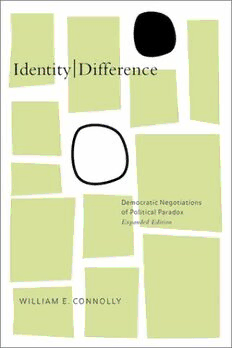
Identity Difference: Democratic Negotiations of Political Paradox, Expanded Edition PDF
278 Pages·2002·14 MB·English
Most books are stored in the elastic cloud where traffic is expensive. For this reason, we have a limit on daily download.
Preview Identity Difference: Democratic Negotiations of Political Paradox, Expanded Edition
Description:
In this foundational work in contemporary political theory, William Connolly makes a distinctive contribution to our understanding of the relationship between personal identity and democratic politics, particularly in the domains of religion, ethics, sexuality, and ethnicity. Every identity, Connolly argues, whether individual or social, presents us with a fundamental and troubling paradox: an identity establishes itself in relation to a set of differences, and it operates under powerful pressures to fix, regulate, or exclude some of these differences as otherness. The dignity of a people or political regime, and the quality of democratic culture, depends on the acknowledgment and ethos cultivated in response to these pressures. In a substantial new essay, Connolly responds to the heated controversy surrounding his ideas when Identity\Difference was first published in 1991, while augmenting his discussion of the virtues of critical responsiveness. The issues of identity and difference cannot be ignored, he contends, and are ubiquitous in modern life. William E. Connolly is professor and chair of the Department of Political Science at The Johns Hopkins University. His most recent books are Why I Am Not a Secularist (1999) and The Ethos of Pluralization (1995), both published by Minnesota. His work The Terms of Political Discourse won the 1999 Benjamin Lippincott Award.
See more
The list of books you might like
Most books are stored in the elastic cloud where traffic is expensive. For this reason, we have a limit on daily download.
